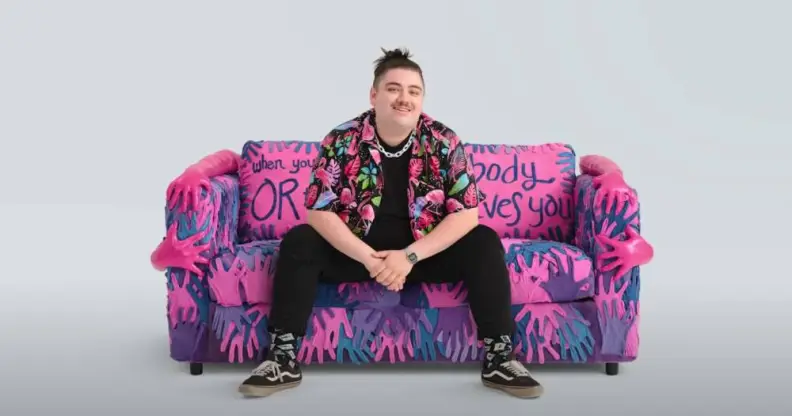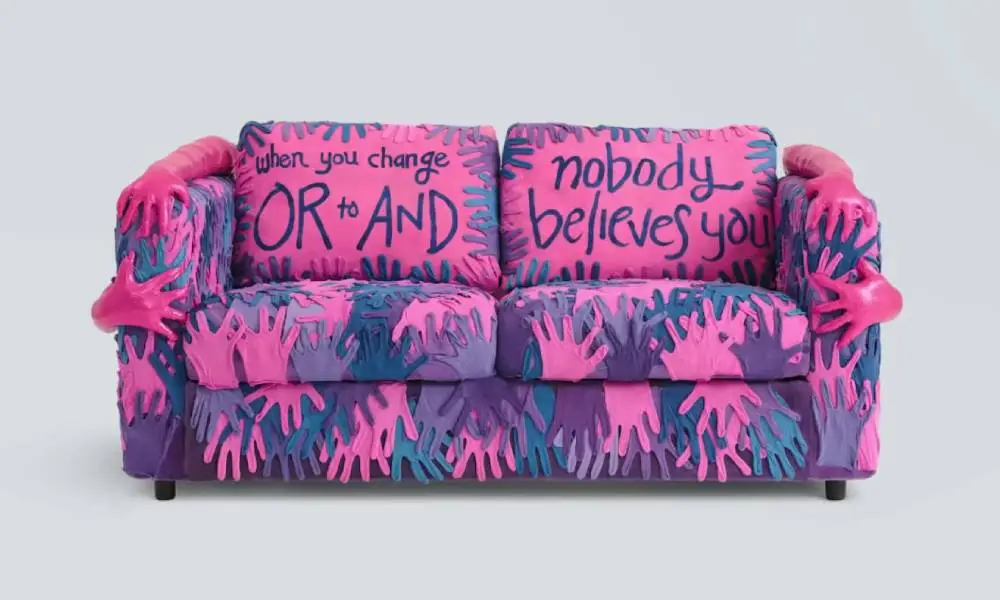‘Bisexual IKEA couch guy’ explains surprisingly moving story behind the nightmare sofa

IKEA has released a new line of loveseats inspired by ten different LGBT+ flags. This includes couch designed after the bisexual flag, trans flag and others. (YouTube/IKEA Canada)
The poet whose words inspired the infamous IKEA bisexual sofa has shared the surprisingly moving story behind the viral design.
IKEA Canada released 10 one-off “Love Seats” last week to celebrate Pride Month. Each is inspired by different LGBT+ Pride flags and personal stories from within the community.
As well as a sofa laced with harnesses for non-binary folk, a seat draped with a candy-coloured rainbow and clouds for the trans community, there was a rather unique two-seater inspired by the bisexual Pride flag.
Yes, to honour those attracted to more than one gender, IKEA designed a couch covered in hands with 3-D arms reaching out in place of armrests and the words “When you swap ‘or’ to ‘and’, nobody believes you” printed on the cushions.

IKEA has released a new line of loveseats inspired by ten different LGBT+ flags. This includes couch designed after the bisexual flag, trans flag and others. (IKEA Canada)
The couch immediately became the collective sleep paralysis demon of the entire LGBT+ community – but what exactly is the meaning behind the cursed couch? It’s a lot deeper than you might think.
IKEA bisexual couch is ‘beautiful’, says artist
Speaking to Insider, Brian Lanigan, who collaborated with designer Charlotte Carbone on the IKEA bisexual sofa, said the words printed on its cushions are inspired by a poem he wrote on bi-erasure.
“I think that taking these words that were used to hurt and invalidate me as a queer person, and turning them into something beautiful is celebratory in its own way,” he told the outlet.
“The inspiration for the couch is my own experiences with bi-erasure and the intense amount of support I would receive from poetry audiences (hence the hands) after performing the poem.”
On Twitter – where he now goes by “bisexual couch guy Brian” – Lanigan explained that he penned the poem in high school after he encountered biphobia from an ex-partner, among others.
I’m a spoken word poet and the hands are meant to represent the audience reaction, especially those of other bisexual folks who would approach me after performances and share their story with me.
2/?
— b’couch brian (@braino_drano) June 29, 2021
He performed the poem aged 15 at the Toronto Poetry Slam Finals, with one line reading: “When people are straight, that makes sense, it’s the way of the world / When people are gay, it’s OK with most.
“You’re welcome to love boys or girls, but when you change ‘or’ to ‘and’ nobody believes you.”
He went on to recite the very same poem when he came out to his parents.
Bi-erasure and biphobia can devastate bi+ people’s mental health, researchers say, with pernicious and deeply harmful stereotypes proving erosive to their sense of self.
Toxics and baseless assumptions – that bisexuality is a “phase” or that they are “greedy”, for example – can leave bi+ folk feeling “invisible”. Such stereotypes can lead to bisexual people not being offered certain healthcare, researchers add.
“Bi+ people experience discrimination from both heterosexual and sexual minority communities, related to repeatedly needing to ‘come out’ as bi+,” said Sabra Katz-Wise, a panellist for the first National Institutes of Health bisexual health research workshop.
“This double discrimination can lead to isolation and loneliness, which can be harmful for mental health.”

